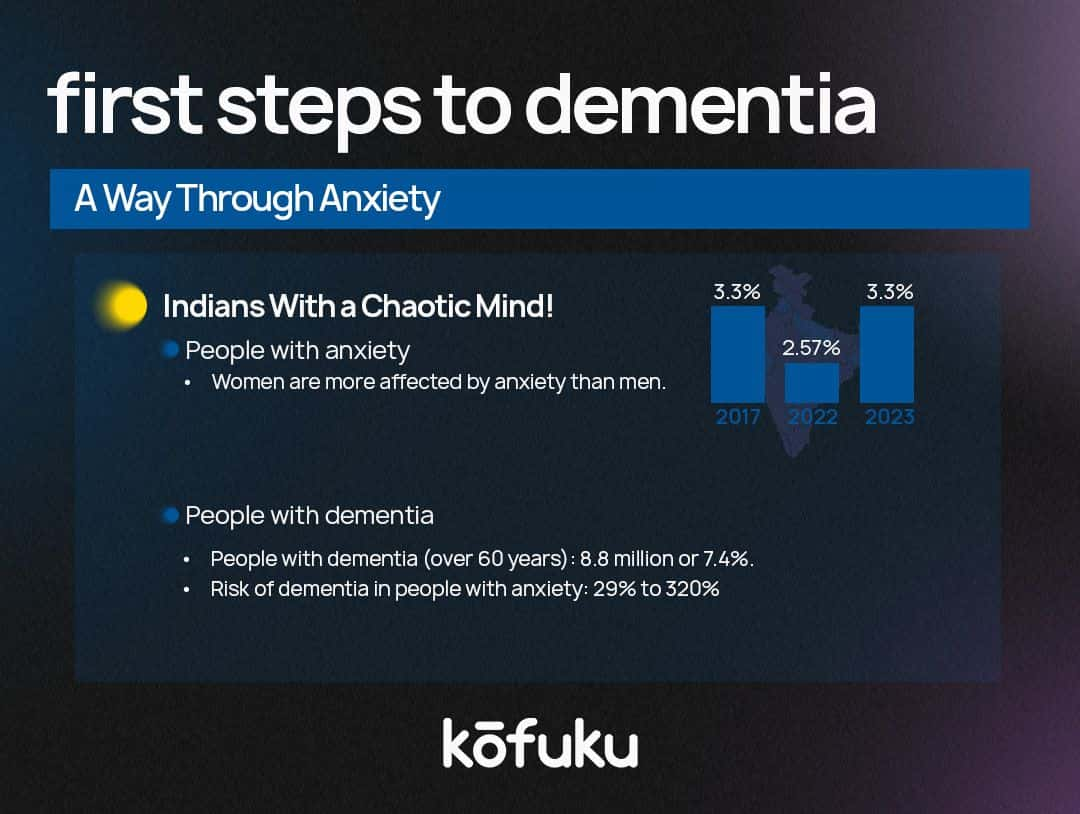Is Anxiety A Hidden Risk Towards Dementia?

Introduction
Dementia is a creeping disorder. It progresses slowly, affecting your memory and daily functioning. Even though ageing is the biggest factor for dementia, some research shows the link between anxiety and dementia risk. But does anxiety increase dementia risk, and if so, how?
Anxiety disorders are some of the most common mental disorders around the world. Its visual symptoms are usually worrying too much and being scared to your toes more often than not.
Studies are showing that chronic anxiety could contribute to cognitive decline, neurodegenerative diseases, and even an increased risk of dementia. And that’s what this blog is all about! We’re here to explore how anxiety affects brain health, the mechanisms behind its impact on cognition, and potential ways to mitigate these risks.
How Anxiety Affects Brain Health
To understand the connection between anxiety and dementia risk, it's essential to examine how anxiety influences the brain:
Increased Cortisol Levels
Too much anxiety leads to chronic stress, which causes extra cortisol to be pumped into the body. Cortisol is the hormone that makes you feel stressed, and too much of it affects the hippocampus, the part of the brain that is responsible for memory and learning.
Over time, this damage can speed up your cognitive decline and increase the chances of getting dementia.
Neuroinflammation and Oxidative Stress
Anxiety triggers inflammation in the brain, leading to the release of harmful chemicals that can contribute to damage to the brain and nervous system.
Oxidative stress, caused by an imbalance between free radicals (unstable atoms that can cause brain damage) and antioxidants, can speed up the brain cell damage process. This process has been linked to Alzheimer’s disease and other forms of dementia.
Reduced Neurogenesis and Brain Plasticity
Neurogenesis, which is the process of creating new brain cells, is paramount for having a healthy cognitive function. Chronic anxiety breaks this process, making it difficult for the brain to repair itself and adapt to changes.
Lesser neuroplasticity weakens the brain’s ability to form new neural connections, which makes us less sharp, increasing the risk of cognitive decline.
Worsened Sleep and Cognitive Decline
Anxiety often makes you toss and turn in bed, which leads to poor-quality sleep and feeling fatigued all the time. The sleep and REM cycles are important for memory consolidation and detoxifying the brain.
Having poor sleep consistently contributes to the accumulation of beta-amyloid plaques, a hallmark of Alzheimer’s disease.

Anxiety and Memory Loss: A Warning Sign?
Anxiety and memory loss are linked with many people who suffer from anxiety often have issues remembering things, concentrating, and making quick decisions. Forgetting things now and then is normal, but when it becomes a normal way of life, especially for people with anxiety, it increases the risk of dementia.
Research has also shown that people with generalised anxiety disorder (GAD), panic disorder, and post-traumatic stress disorder (PTSD) have a higher risk of developing dementia compared to those without these conditions.
The Role of Anxiety in Neurodegenerative Diseases
Neurodegenerative diseases, including Alzheimer’s and Parkinson’s, involve progressive brain cell deterioration. Anxiety as a risk factor for dementia may accelerate this process through various mechanisms:
-
Amyloid Plaque Accumulation: Anxiety-related stress increases the formation of beta-amyloid plaques, which disrupt neural communication and lead to memory loss.
-
Vascular Damage: Anxiety contributes to high blood pressure and heart disease, both of which impact blood flow to the brain, increasing the risk of dementia.
-
Worsened Cognitive Reserve: Chronic stress and anxiety reduce cognitive reserve, the brain’s ability to compensate for damage. Lower cognitive reserve makes people more susceptible to neurodegenerative diseases.
Preventing Dementia Related to Anxiety
Now that we know the strong connection between stress, anxiety, and dementia, we need to learn to manage anxiety effectively and reduce the risk of cognitive decline. Here are some ways to protect your brain health:
Stress Reduction Techniques
There are many ways to be mindful and reduce stress, and many blogs online already focus on yoga, meditation, and breathing exercises. These activities can also help with your general physical and mental well-being.
Regular Physical Activity
Exercise improves blood circulation, reduces stress, and enhances neuroplasticity and aerobic exercises like walking, swimming, and cycling have been shown to improve mood and cognitive function.
Healthy Diet for Brain Health
A nutrient-rich diet plays a key role in reducing anxiety and preventing dementia. Consuming omega-3 fatty acids (found in fish, nuts, and seeds), antioxidants, and anti-inflammatory foods can support brain function. If you’re unaware of what superfoods are, click this blog to learn about it!
Quality Sleep
Getting a good night’s rest is essential for brain health. So remember to avoid caffeine before bedtime, maintain a consistent sleep schedule, and reduce screen time before bed and over time, it will improve your sleep quality and even reduce the risk of dementia-related cognitive issues.
Cognitive Engagement
Keeping the brain active through reading, puzzles, learning new skills, and social interactions strengthens cognitive reserve and, at the minimum, helps delay dementia symptoms.
Professional Mental Health Support
Seeking therapy, counselling, or medication for anxiety disorders can help manage symptoms and prevent long-term cognitive impairment. Cognitive-behavioral therapy (CBT) has been particularly effective in treating anxiety and reducing its impact on brain function.

Reducing Dementia Risk Through Anxiety Management
Yes, ageing is inevitable, but taking proactive steps to manage anxiety can help protect your cognitive health. Now that we know the connection between stress, anxiety, and dementia, we see the importance of mental well-being being a crucial part of dementia prevention.
Several studies have hinted that people who manage their anxiety through lifestyle changes and mental health techniques experience a slower cognitive decline. So you can do that too by prioritising mental health, taking part in stress-reducing activities, and adopting brain-friendly habits.
Conclusion
Anxiety is so much more than just a mental illness; it’s the gateway to worse mental conditions like dementia. Now that you know the link between anxiety and dementia, you too can adopt a lot of ways to reduce the chances of suffering from dementia.
While more research is needed to establish causation definitively, existing evidence suggests a strong correlation and that managing anxiety is an important step in reducing dementia risk.
FAQs
Can anxiety increase the risk of dementia?
Yes, chronic stress has been linked to risk of dementia. Long term stress can lead to inflammation, high cortisol levels and changes in brain function that may contribute to cognitive decline.
How does anxiety affect brain health?
Anxiety releases stress hormones such as cortisol and when the hormone is elevated for longer periods it can damage your brain cells, impair memory and concentration.
How do I know my anxiety is affecting my brain?
If you constantly experience brain fog, forgetfulness and difficulty focusing along with anxiety. It may be time to discuss your problems with a healthcare professional.
Can lifestyle changes help protect the brain from anxiety related damage?
Yes, regular exercise, a balanced diet, meditation, social activities and good sleep can help manage anxiety and help with brain health.
How can diet help prevent anxiety related dementia?
Anti-inflammatory foods, omega 3, fatty acids, and antioxidants can support better brain health and reduce the effects of stress.
By taking control of your anxiety, you will not only improve your emotional well-being but your long-term brain function as well.






